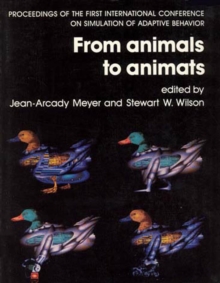
An Introduction to Genetic Algorithms Paperback / softback
by Melanie (Portland State University) Mitchell
Part of the Complex Adaptive Systems series
Paperback / softback
Description
Genetic algorithms have been used in science and engineering as adaptive algorithms for solving practical problems and as computational models of natural evolutionary systems.
This brief, accessible introduction describes some of the most interesting research in the field and also enables readers to implement and experiment with genetic algorithms on their own.
It focuses in depth on a small set of important and interesting topics-particularly in machine learning, scientific modeling, and artificial life-and reviews a broad span of research, including the work of Mitchell and her colleagues. The descriptions of applications and modeling projects stretch beyond the strict boundaries of computer science to include dynamical systems theory, game theory, molecular biology, ecology, evolutionary biology, and population genetics, underscoring the exciting "general purpose" nature of genetic algorithms as search methods that can be employed across disciplines. An Introduction to Genetic Algorithms is accessible to students and researchers in any scientific discipline.
It includes many thought and computer exercises that build on and reinforce the reader's understanding of the text.
The first chapter introduces genetic algorithms and their terminology and describes two provocative applications in detail.
The second and third chapters look at the use of genetic algorithms in machine learning (computer programs, data analysis and prediction, neural networks) and in scientific models (interactions among learning, evolution, and culture; sexual selection; ecosystems; evolutionary activity).
Several approaches to the theory of genetic algorithms are discussed in depth in the fourth chapter.
The fifth chapter takes up implementation, and the last chapter poses some currently unanswered questions and surveys prospects for the future of evolutionary computation.
Information
-
Available to Order - This title is available to order, with delivery expected within 2 weeks
- Format:Paperback / softback
- Pages:221 pages
- Publisher:MIT Press Ltd
- Publication Date:02/03/1998
- Category:
- ISBN:9780262631853
Information
-
Available to Order - This title is available to order, with delivery expected within 2 weeks
- Format:Paperback / softback
- Pages:221 pages
- Publisher:MIT Press Ltd
- Publication Date:02/03/1998
- Category:
- ISBN:9780262631853










